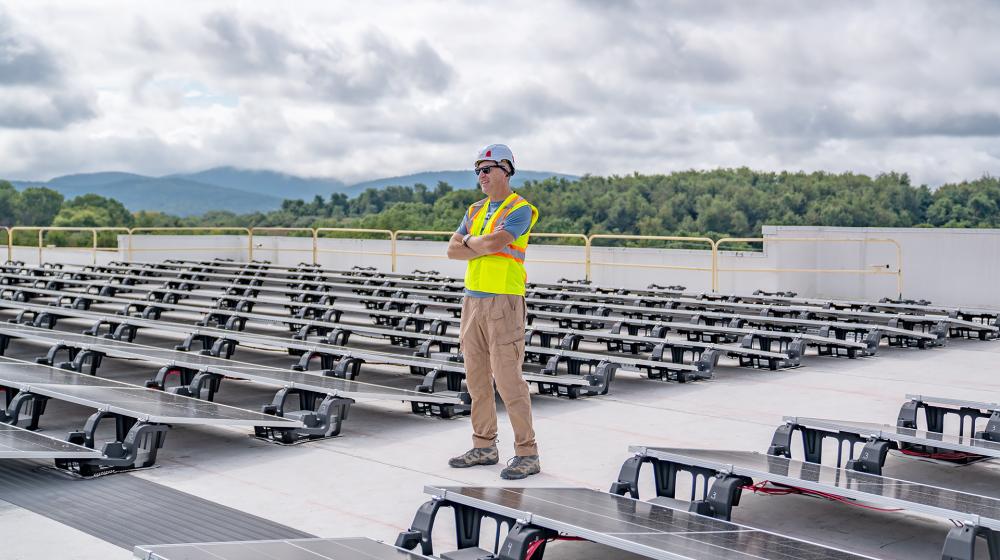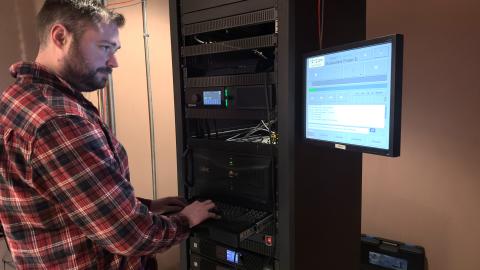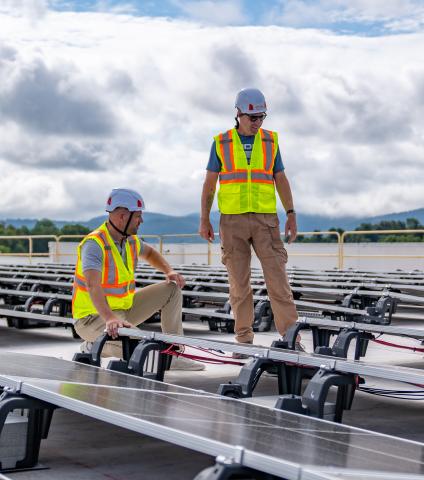
Hundreds of local residents and visitors gather at Waynesboro’s Zeus Digital Theater each week to view the latest theatrical releases on eight big screens, never realizing that they are being transported to other worlds via the power of the sun.
A 241kw system perched high atop the 40-foot building keeps the entertainment venue operating at peak efficiency to lower costs so the show can go on for many years to come. While it may not be a Hollywood blockbuster, the Zeus story is one worth telling with compelling characters and a few plot twists before the big payoff.
The Back Story*
Enter Brett Hayes, a Marine veteran and self-described serial entrepreneur who had launched 13 business startups when he started the venture. He says there aren’t a lot of local theaters of this size that aren’t franchises or multi-generational family businesses, so he needed some help to get the project off the ground.
“Back in 2009, we were in the great recession,” says Hayes. “I had 33 acres of commercial property I had developed, and this was going to be a big box store. That project fell through, and I was talking to some other people about putting in a movie theater. When that deal also fell through, I thought ‘why don’t I just build it myself?’”
As it turns out, that was easier said than done. Hayes would need some help to put his business plan into action and learned about the role USDA Rural Development (RD) could play in getting the theater up and running.
The Catalyst
“I was not initially aware of the Business and Industry Loan that I would later get,” said Hayes. “My banker requested that we look into it in order for them to fund the project. Even though we had plenty of collateral going in and had plenty of experience at the time, it was not enough.
“I do believe that, without the USDA, we wouldn’t have been able to get the project off the ground. The banks needed to have that guarantee from the USDA.”
With funding from USDA RD, Hayes constructed his building and served his first bag of popcorn in less than a year. He followed the tradition of associating theaters with Greek and Roman gods, naming his venture after their king who wielded a lightning bolt to tie into the digital format.
The Big Event

Business was booming until COVID hit and theaters shut down. Where others saw disaster, Hayes saw opportunity and decided to tap into resources now available through the Inflation Reduction Act to make a major move to solar power. The building is heated and cooled with electricity and the projectors run on electric current, so it is one of the biggest expenses for a large, multi-screen theater.
This financial decision was important for the long-term viability of the business, which has become a hub of the community. Brett’s son John oversees day-to-day operations in his role as the general manager and has built strong relationships with local businesses.
“Waynesboro hadn't had a movie theater in over a decade,” says John Hayes. “I think it's really been an anchor point, bringing in guests from other regions to discover the city and everything it has to offer.”
The Midpoint
The elder Hayes knew that the return on investment would be delayed for at least 25 years but says it made sense to take the plunge now instead of waiting for inflation to drive up the system install price. The associated tax credits were a selling point as well.
The decision to move forward with the project brought Mikey McCue into the narrative. The commercial business development sales representative for Tiger Solar introduced Brett to USDA RD’s Rural Energy for America Program (REAP) as a potential funding source.
“REAP is a fantastic tool to help businesses like Zeus make the switch to generating their own energy,” explains McCue. “It really helps move the needle for projects where finances could be a hurdle. In virtually all cases where the eligibility is good, we recommend pursuing a grant.”
The Crisis and Climax

The Zeus system installation was no cakewalk for Hayes and the Tiger Solar team. The height of the building presented a major hurdle for installers and the work was done in the heat of summer.
It took about two months to install the physical components and required safety gear to navigate a stair tower in the rear. McCue says his team covered virtually all usable space on the roof and had to install some supporting members underneath due to load issues. Yet, those hurdles weren’t unexpected for the engineering procurement and construction company, which kept its promise to install the largest system the roof could hold.
“Even with some of the delays for equipment to come in, we got things up and running and turned on the system before the end of the year,” adds Hayes.
REAP grants can add about three to four months on the front end for the application and a few months after installation for reimbursement, so McCue says it’s really important for potential applicants to account for an extension of the project timeline. Rural Business Cooperative Services Director Joe Boatwright echoes that sentiment and cautions interested businesses to do their homework first.
“This is a federal program, so the application process includes multiple steps and timelines,” says Boatwright. “Prospective applicants really need to study the requirements and understand that they will need some available capital to purchase and install the system prior to receiving the grant funds.”
“Any underwriter or solar company that works with REAP grants should be able to give you a good set of expectations,” McCue adds. “Make sure you have a good line of communication with whoever’s doing your grant application.”
The Realization
The conversion to solar has been pretty seamless on the customer side with no noticeable difference in operations after the switch. John says he’s gotten questions from guests and staff about potential outages or service interruptions, but it’s really not an issue due to net metering.
The sun hits the 538 solar panels and the four inverters generate power to feed all the loads running in the theater. When the system generates more power than the building needs, the meter actually moves backwards as that energy goes back to the grid. Zeus gets credit for all of the power produced, so the facility has an ample supply for cloudy days and nighttime showings.
“There are no batteries in this system, and we don’t store any power here,” explains Brett. “When we’re producing enough energy, our meter doesn’t move at all. If I roll my meter back by 100 kw hours during the day and use them at night, I effectively didn’t pay anything for those hours. As the days get longer, we produce more and more energy.”
Hayes says he’d recommend REAP to other businesses IF they own the building but cautions that roof needs to be in good shape if the system will be mounted in that location.
“I like to say it’s the first time since the 19th century that local purveyors or businesses can own their means of energy production,” says Brett. “They used to generate power with water wheels for grist mills. Now, you can kind of do that with solar.”
*Headings adapted from screenwriter David Trottier’s “The Magnificent 7 Plot Points.”

